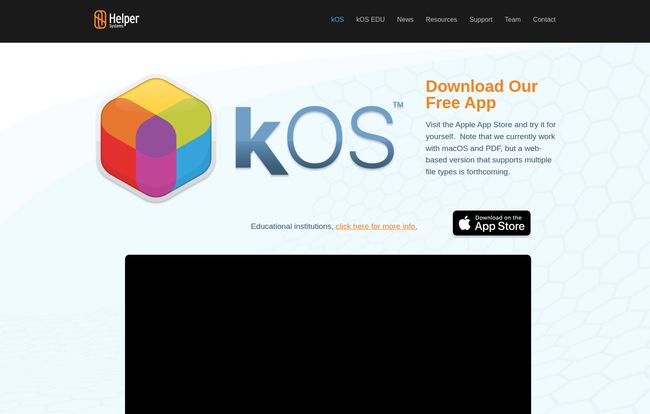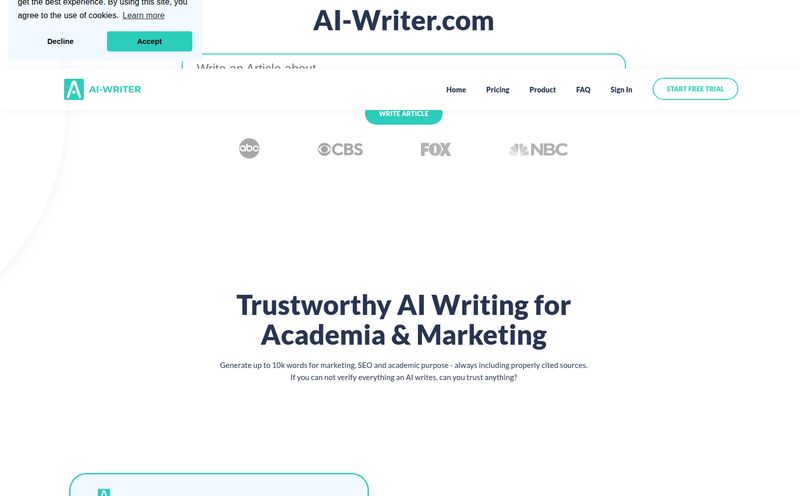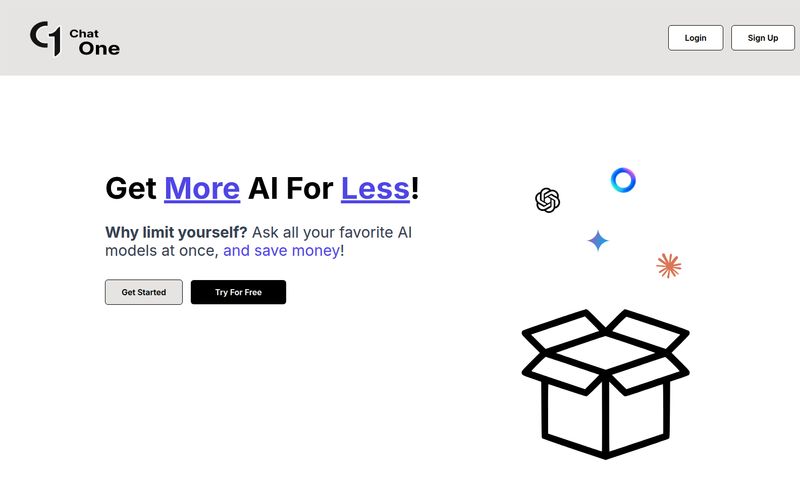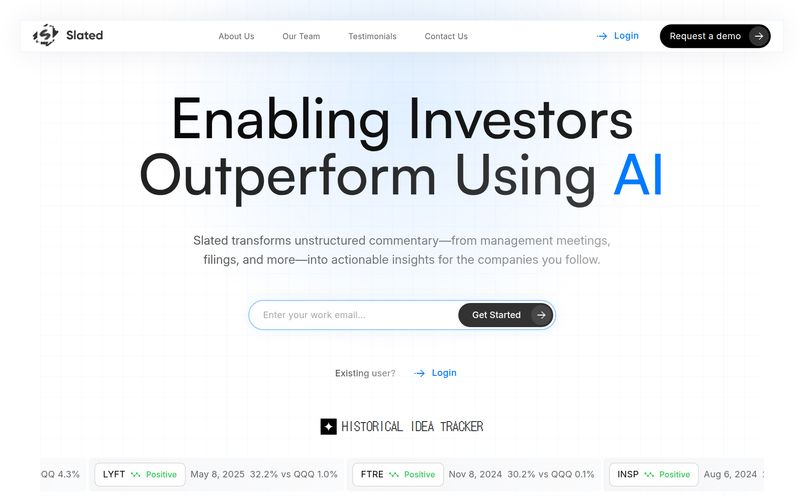If you're a student, an academic, or a professional researcher, your digital life is probably a chaotic mess of PDF files. I know mine is. My 'Research' folder is a graveyard of horribly named files like final_v2_final_FINAL.pdf and important_study_2022.pdf. It’s like a digital dragon's hoard, but instead of gold, it’s full of unread papers and the crushing weight of academic guilt. Sound familiar?
For years, we've been promised that AI would be our savior. And in many ways, it has been! Tools that summarize, analyze, and help us write have popped up everywhere. But they all come with a nagging question that keeps me up at night: where is my data going? When I upload a sensitive, pre-publication paper or a proprietary market study to a cloud-based AI, am I just feeding it into the great, anonymous machine? That's a risk I'm not always willing to take.
And that, my friends, is why I got so excited when I stumbled upon a tool called kOS. The name is a bit nerdy, but its promise is huge: an AI-powered research assistant that lives entirely on your computer. No servers. No internet required. A private brain for your research. Could this be the one? I had to find out.
What Exactly is kOS, Anyway?
At its core, kOS (from a company called Helper Systems) is a tool for creating your own personal, private database out of your PDF collection. But that’s selling it short. Think of it less like a simple folder and more like a personal librarian who has read every single document you own, memorized it, and is ready to answer your questions instantly. It’s built to help you organize, discover, and actually use the information you've gathered, not just store it.
It’s a desktop application that scans your PDFs and builds a powerful, searchable knowledge base. It's designed to streamline the entire research process, from initial discovery to final citation.

Visit kOS
The Big Deal: Why Offline and Private AI Matters
Okay, let's talk about the elephant in the server room. Most AI tools you use today—from ChatGPT to the countless AI wrappers out there—work by sending your query (and sometimes your entire document) to a massive data center somewhere in Virginia or Oregon. For a casual question, who cares? But for serious research? That's a different story.
Imagine you're working on groundbreaking medical research, a confidential legal case, or a competitive analysis for your company. The last thing you want is for that proprietary information to become training data for a public Large Language Model. It’s a legitimate concern that has led many institutions to outright ban the use of certain AI tools. This is where kOS plants its flag. By operating completely offline, it creates a secure 'air-gapped' environment for your most sensitive work. Your data stays on your machine. Period. It's a breath of fresh air, honestly, and in my opinion, its single biggest selling point.
My Favorite Features (And What They Actually Mean for Your Workflow)
A tool can promise privacy all day long, but if it's clunky to use, it'll just gather digital dust. Luckily, kOS has some genuinely smart features that go beyond the basics.
Folders Reimagined: More Than Just a Storage Bin
The first thing that caught my eye was the concept of 'reimagined folders'. Instead of just being a place to dump files, kOS folders are active. When you add PDFs, the tool automatically rips out the table of contents, keywords, authors, and other metadata. This means you can instantly get a high-level overview of a document without even opening it. It's like every book on your digital shelf suddenly has neatly organized sticky notes pointing to all the important chapters and ideas. A massive time-saver.
Citations That Don't Make You Want to Cry
I have a confession. I hate doing citations. The sheer tedium of getting every comma and period right for APA vs. MLA vs. Chicago style is enough to send me into a spiral of procrastination. I've used other reference managers, and they're fine, but kOS builds citation generation right into the workflow. As you work with your sources, it keeps track, and you can copy and share properly formatted citations with a click. It’s a small thing that saves a mountain of frustration later.
The 'Proof of Work' and Ethical AI Angle
This is where things get really interesting. With the rise of AI, we're also seeing the rise of academic dishonesty concerns. How can a professor know if a student actually did the research or just had an AI write the paper? kOS has a clever answer: Proof of Work. It creates a log of your interactions with the source material—what you read, what you queried, what connections you made. It's a digital paper trail that can be used to demonstrate academic integrity.
Even more, it encourages the ethical use of AI by providing tools to properly credit the AI's assistance in your work. This is incredibly forward-thinking. Instead of pretending AI doesn't exist, it gives you a framework for using it responsibly. I've always felt this is the direction we need to go, and it's cool to see a tool built around that philosophy.
So, Who Is This Actually For?
While I can see a lot of people benefiting from this, it really shines for a few specific groups:
- Grad Students & Academics: This is the most obvious one. If you're juggling hundreds of research papers for a thesis or literature review, this could become your central nervous system.
- Legal Professionals: Imagine loading all the discovery documents for a case into a private, searchable database on your laptop. No confidentiality breaches.
- Market Researchers & Analysts: Keep all your industry reports, competitor analyses, and financial statements in one place, ready for instant querying without leaking sensitive corporate data.
Basically, if your job involves reading and synthesizing information from a large number of PDF documents, this tool is built for you.
The Elephant in the Room: The Not-So-Good Stuff
No tool is perfect, and it's important to be honest about the limitations. kOS has a couple of big ones.
First and foremost, it's macOS only. As in, if you're on a Windows or Linux machine, you're out of luck. That immediately cuts out a huge portion of potential users. The website mentions a web-based version is 'forthcoming,' but in the tech world, that can mean anything from next month to never. For now, it's an Apple-exclusive club.
It's also PDFs only. In my workflow, I also deal with web articles, Word documents, and Google Docs. kOS doesn't handle those, so it can't be my one-and-only research hub. It's a specialized tool for a specific file type, so you need to know that going in.
Let's Talk Money: The kOS Pricing Model
Pricing is always a big question, and kOS keeps it pretty straightforward.
There's a Free version that gives you the basic research features. This is great for getting a feel for the tool and seeing if it fits your workflow without any commitment.
Then there's the Premium tier, which costs $9.99 per month. This unlocks the more powerful AI features, like getting AI-generated summaries, exploring conceptual connections between documents, and expanding the scope of your queries. Now here's the kicker and, frankly, an amazing deal: they offer a free 6-month trial of Premium. Six months! That's more than enough time to put it through its paces on a real project and decide if it's worth the subscription. It's a pretty confident move on their part.
My Final Verdict: Is kOS Worth Your Time?
So, what's the bottom line? I've gotta say, I'm genuinely impressed. It's not a tool for everyone—the macOS-only limitation is a major hurdle. But if you are a Mac user who lives and breathes PDFs and you're concerned about privacy, kOS is not just a good option; it might be one of the best options available right now.
It’s a thoughtfully designed piece of software that solves a real, tangible problem. It trades the all-encompassing power of giant cloud AI for the security and peace of mind of a local, private system. For me, that's a trade I'm happy to make for my most important work. The generous 6-month trial makes it a complete no-brainer to at least try. You might just find the research assistant you've been looking for.
Frequently Asked Questions about kOS
- What is kOS?
- kOS is a research tool for macOS that allows you to create a private, offline database of your PDF files. It uses on-device AI to help you manage, search, and analyze your documents, as well as generate citations and prove your research process.
- Is kOS really private and secure?
- Yes. According to its developer, Helper Systems, kOS does not use servers and works entirely offline. All of your data and the AI processing happen directly on your Mac, ensuring your research remains private.
- What platforms does kOS work on?
- Currently, kOS is available for macOS only. A web-based version is said to be in development, but there is no release date yet.
- How much does kOS cost?
- kOS offers a free version with basic features. The Premium version, which unlocks advanced AI capabilities, costs $9.99 per month. They currently offer a free 6-month trial for the Premium tier.
- What is the 'Proof of Work' feature?
- Proof of Work is a feature that logs your interactions with your research documents. It creates a verifiable record of your research activities, which can be used to demonstrate academic integrity and show how you arrived at your conclusions.
- Can I use kOS for files other than PDFs?
- No, at this time kOS is designed to work exclusively with PDF files. It does not support other document formats like .docx or web pages.
Reference and Sources
- For more details on the tool and to download it from the App Store, you can check out the developer's official page: Helper Systems - kOS.



